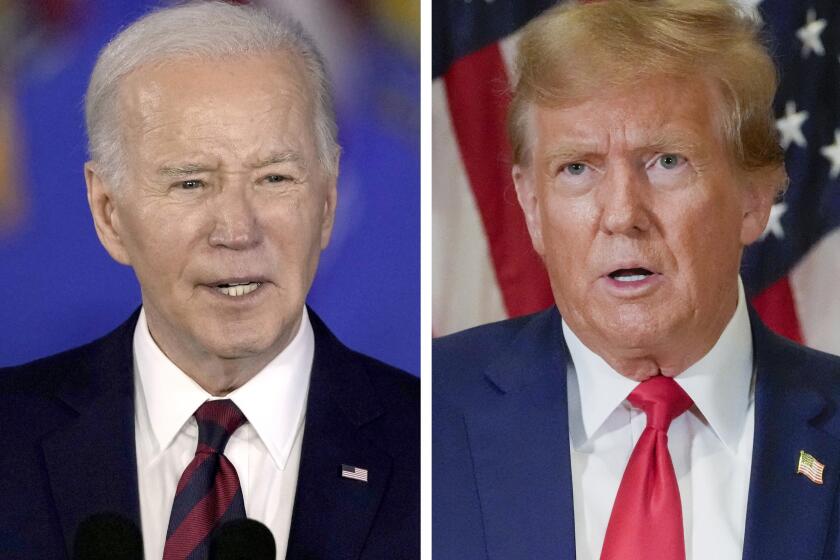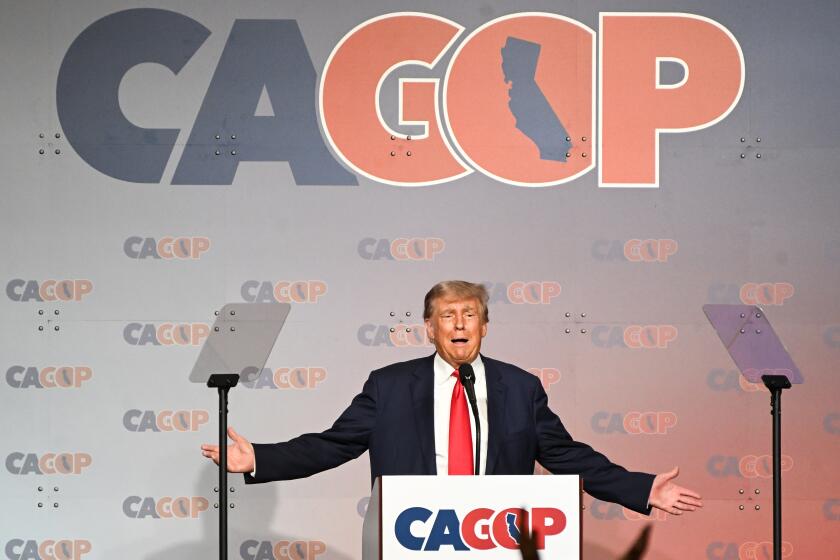Q&A; : Inside a Political ‘Outsider’ : Democratic State Senate Candidate Tom Hayden Discusses the Issues
Rich, liberal and heavily Democratic, the newly drawn 23rd Senate District embraces some of the choicest real estate in California: Malibu, Santa Monica, West Los Angeles, Beverly Hills, Hollywood and the southern San Fernando Valley. This year, it is the stage for one of the state’s most spirited primary battles.
On June 2, Democratic voters will choose their nominee among Assemblyman Tom Hayden of Santa Monica, State Sen. Herschel Rosenthal of Los Angeles and businesswoman Catherine O’Neill of Pacific Palisades. The Republican Party has not fielded a candidate, so the winner will face only minor-party opposition in November.
This Q&A; with Hayden is the second in a series of interviews with the three candidates. Hayden was interviewed by Times staff writer Nancy Hill-Holtzman.
Q: Is this your last hurrah in politics?
A: No. I’ve been involved on the American political scene for 32 years. I outlived most of my opposition. I expect to continue doing that.
Q: By all accounts, you’ve been an ambivalent legislator. You get very mixed reviews about your effectiveness, and some people say you are bored in Sacramento. What about that?
A: That’s a total distortion. I’ve been named legislator of the year by the League of Conservation Voters, by the University of California Students, by the Cal State Students. The reviews you refer to are by no means objective. I’ve never been bored. I’ve been restless. It’s not easy to work within a system that is full of inertia and corruption and opportunism, but that’s where the great issues of our time have to be resolved.
Q: So you want to go back to resolve the great issues of our time?
A: Somebody has to reform the system, and I know where the skeletons are.
Q: In 10 years in the Legislature, what have you actually done to reform it from within?
A: I’ve been, number one, a thorn in the side of the Speaker and the establishment. The decision I arrived at after four years was to start trying to complement a legislative strategy with an initiative strategy, so I chaired the campaign for Prop. 65. It seemed unbelievable that the Legislature would not want to ban toxics from drinking water, but we couldn’t get it through the Legislature.
Q: If you can’t get your bills passed and signed by the governor, can you be an effective legislator?
A: That implies that the only way to be effective is if you’re at the trough. A reformer has to stay outside the club of power-grabbers. If you act on principle, you shouldn’t be accused of being ineffective. The process of reform in an ossified establishment seems slow to those who are sitting on the fence, but it gains momentum and the turnaround is very quick.
Q: Why are your constituents better off having you chipping away at reforms instead of having somebody like Sen. Rosenthal, who gets bills passed and takes care of what he perceives as his constituents’ issues?
A: That would be a false characterization.
Q: Of Rosenthal or of you?
A: Both. When I say reform is the most important priority, it doesn’t mean I’m doing nothing in the meantime. I’m trying to be modest and not like politicians who drag out lists of their accomplishments when life is getting worse. I have passed 92 measures into law or state policy. But I’m also trying to storm the Bastille of the special interests, and that’s difficult when you’ve had Republican governors and Republican presidents.
Q: What about the rap that you have no major legislation to your credit?
A: Despite the fact that I’m saddled with a conservative Republican governor, I was just able to get signed into law the biggest pesticide reform certainly in 25 years. I had to fight legislators from both parties to allow community colleges like Santa Monica to recruit people from all over the state. Making permanent the victims’ assistance and neighborhood watch authorization under the state Office of Criminal Justice Planning was my bill.
Q: What’s this reputation for a lack of collegiality with other legislators all about?
A: I’m not part of the club. I don’t feel I was sent up there to schmooze. I think I get along amazingly well for a person who basically thinks the whole system is rotten.
Q: Could it be that the Legislature just isn’t your forte? That you’re, perhaps, a visionary, writer or teacher and don’t belong with this group?
A: Let the people decide. I want to be there. I’m trying to change things, so I have to take my case into the power center.
Q: Isn’t it hard to sell yourself as an outsider to people who have elected you for the past 10 years?
A: I haven’t met a single person who has that problem. They see me as an outsider. I am an outsider.
Q: A lifelong outsider?
A: No, no. I am an advanced scout for the reform movement.
Q: What is this “special interest state” you’re so vigorously attacking?
A: It is the permanent web of interest groups that dominate politics primarily because of money. They represent a lobbying corps which has doubled in the last 10 years. They basically dictate the boundaries of legitimate debate in Sacramento.
Q: Can you give me an example?
A: Health care. You can’t get anything done without a green light from the medical, legal and insurance special interest groups--which means nothing gets done. The biggest 10 special interest groups spend, by our estimate, $17 (million) to $20 million every year.
Q: Does Sen. Rosenthal embody those qualities and approach that you’re running against?
A: Hersch often votes like me on environmental issues or social welfare issues, but behind the scenes he is a central player in the special interest state. He is on the two committees that are known as juice committees, because that’s where you squeeze contributions. He has raised $1.3 million since he’s been in the Senate, even though he’s never had an opponent. If there’s one fundamental that separates me (from him), it’s the recognition that without public finance and other reform, we can’t achieve anything over the wishes of the special interests.
Q: In 1989, The Times printed a list of trips taken by legislators at the expense of special interests. Rosenthal was number two but you were 10th, with $22,000-plus from a major film company for some trips around the world.
A: I went to Auschwitz and . . .
Q: And Lorimar Telepictures paid for it?
A: I saw the scene of the Holocaust and I met with Lech Walesa. I was married to Jane Fonda then and a movie company flew us to Europe because she was doing some promotion. They also flew my family on a ski vacation. I thought to have a private company that my wife was working with fly me so that I could go to Auschwitz or Gdansk was very justifiable. But the main point is that was not a special interest that had business before the Legislature.
Q: The movie industry didn’t have legislation in Sacramento?
A: It’s one company. I’d probably vote against them just to prove my independence.
Q: You’re running against special interest and their influence, but your Assembly campaigns accepted $98,300 from 1987 to 1991 from special interest groups--the doctors, the unions, the optometrists, the beer and wine wholesalers, the Horsemen’s Benevolent Assn. and others. If they’re so bad, why are you taking money from them?
A: Some of it is unsolicited and most of it is paltry. You will find that there’s virtually no instance in which I’ve voted for something a contributor wanted. I just find it gross.
Q: How about Doug Badt and the Sand & Sea Club in Santa Monica? You did vote to keep his private beach club in place for years.
A: Quite the opposite. I told Doug Badt that I was against not only Michael McCarty’s private luxury hotel, but against the continued existence of the private club on the beach.
Q: But you carried legislation to extend its lease.
A: With (Sen. Rosenthal). But only because it was an interim solution while a resolution of the beach site was being decided by the city.
Q: But that was something Badt wanted and something that Ellen Gilbert, a club member, wanted. The Gilberts are major contributors to you. Badt is a contributor too.
A: No. My record on that is absolutely spotless. Period.
Q: Wasn’t voting to extend the lease for a while a favor to your contributors? During that same period you were accepting contributions from Badt--September, 1989, and September, 1990--$1,000 each year.
A: I don’t remember anything in ’90. The record shows I’m a person whose honesty is basic.
(Editor’s note: The Santa Monica City Council approved the beach hotel in the summer of 1990, but the approval was overturned by voters in a November, 1990, referendum.)
Q: You went to a council meeting on the proposed beach hotel, after which then-Councilwoman Chris Reed said you were “drunk as a skunk.”
A: That’s her opinion.
Q: You admitted having several drinks.
A: Yeah, but the real issue is why the proponents of the hotel were in the gutter trying to make an issue of that. I stand by the statements I made that night. It taught me also a valuable lesson, which is to stop drinking altogether. But I don’t want to talk about that--I’m not sure that, unless somebody’s performance is impaired, this is a core issue of politics.
Q: Character is a core issue of politics.
A: Hey, I don’t drink. Case closed! I’m not sure it’s a character issue.
Q: Are you an alcoholic?
A: No. And I don’t drink. It is not a legitimate issue unless you think somebody’s behavior in public life has been impaired. Why would Alcoholics Anonymous be Alcoholics Anonymous if you’re supposed to go around talking about it?
Q: Considering the statewide publicity after the meeting, don’t you think people might wonder if you are doing your job?
A: No. People are usually pretty frank with me, and you’re the first person in two years who’s asked me about that. I know a lot of people won’t have the courage to ask a question like that, but you’d think that if it was a widespread concern it would come up. I haven’t had a drink since.
Q: Your attendance record--that’s another criticism. You missed 25% of the votes one year. It’s one of the worst records in the Legislature. How do you explain that to the voters who elected you?
A: It’s a lie, used for political purposes. Over 10 years, by the criteria of the days that the Legislature does business, my attendance rate was approximately 90% except for one year, 1990--when I (still) didn’t miss any key votes. I had prearranged absences with the Speaker. I was going through a divorce. I was coming home every night or staying home to get my son through his senior year in high school. I was trying to run the Big Green campaign.
Q: Let’s talk about some specifics that have either been in printed articles or listed in the California Political Almanac. In ‘88, you missed a critical vote on abortion funding for the poor because you were in New York promoting a book.
A: What critical vote? It’s possible that I missed a vote (but) I don’t recall that it was critical. Was my vote determinative? Never heard of it.
Q: During the ’90 budget fight, you were fishing in Alaska.
A: This is complete baloney. My son and I had a five-day trip. I asked the Speaker if I could be excused. I was willing to forgo the trip if there were key votes. It was the summer of the long budget doldrums. There was a staging of mock battles when votes would be taken with full awareness that the votes were not there for budget resolution.
Q: You put a lot of money and time and effort into the Big Green initiative and it failed. The polls showed that when your name was associated with it, it became less popular. What’s your assessment of the loss of Big Green and, as painful as it might be, your role in it?
A: I saw a poll by the group that ran the opposition campaign and it gave all the reasons that voters gave for why they voted against Big Green. The largest block, 37%, said it was too expensive. Another 36% to 37% said it went too far and 3% said it had something to do with me.
Q: You don’t think some who said it went too far associated “going to far” with your ‘60s politics?
A: No. The defeat of Big Green was a tragedy. If I have to carry that cross, I will gladly do it, but I think the real reason it lost is that the other side was able to spend enough to convince people that it was too costly.
Q: How does your support for the death penalty fit into your overall philosophy? How do you feel about the recent Harris execution?
A: I am morally and emotionally ambivalent about it for all sorts of reasons, and therefore, say it should be left on the books--even though it has a very remote rationale. No doubt Harris committed heinous crimes. I have not yet felt that we’re in a safer place because he’s dead. It would be fine with me if Harris was just held for life. I’ll feel better when we come to terms with the question of why those who have the capital never get the punishment.
Q: You’ve been attacking Cathy O’Neill, your other opponent, on the issue of the environment. I assume your polls show she’s taking away votes from you.
A: For the last 30 or 40 days, she seems like nothing but negativity. So I decided to respond. Her role with the International Monetary Fund is awful. This environmental district shouldn’t have somebody who last year was a public relations officer for a group which cuts down rain forests and cuts family budgets in developing countries. Here’s a person talking falsely about my attendance in Sacramento who has not been here (in California) for 12 years.
Q: This has been called the year of women in politics. Do you think O’Neill will benefit?
A: I think Cathy benefits from that. On women’s issues, I hope she’s there.
Q: Are you?
A: As much as a man can be. I’ve been first on a number of key issues for women. I was the first to try to assist women who are victims of carpal tunnel disease and ligament problems and visual problems from working in these pink-collar ghettos with video display terminals.
Q: What about abortion rights?
A: All candidates say they’re pro-choice. You’ve got to do more. California has got to be the alternative to the federal government for the foreseeable future.
Q: Are you personally opposed to abortion?
A: No. I think it comes in the category of ethical relativism. It means you try to make a balanced choice. There’s no absolute purity in it, but on balance, if I were in that situation, I would opt for my continued health and my independence over that of the fetus.
Q: Here are some things women have told me about you: You may love women but you don’t really like them in positions of power, that you’re uncomfortable with smart women, that you don’t think women are full players. Then one person, Vivian Rothstein, said you were the only man in the ‘60s movement who ever took her seriously in politics.
A: She’s right! This must be difficult for you because you’re trying to figure me out and I’m 30 years minimum to figure out. Those claims are completely outrageous. My chiefs of staff have perennially been women. I’ve worked with tough, strong women. I’ve been married to a tough and strong woman. My record is clear that I’ve been a non-sexist citizen, legislator, partner.
Q: Over the years, you’ve been repeatedly criticized in print as an arrogant, egomaniacal opportunist. It must be painful for you.
A: No, that’s why I got out of journalism and into politics. At least in politics things are straight up. I think the environment is going to be saved before journalism.
Q: A story by John Balzar of The Times, after your separation from Jane, said, “There is no underestimating how much this marriage meant to his politics.” Do you still have access to the same sources of money and power as when you were married to Jane Fonda?
A: That question smacks too much of trying to evaluate the marriage in terms of its political use. That is so weird an idea to me that I can’t think in those terms. I’m doing well in fund raising from the same people who have supported me in the past. Divorce is painful but, I mean, it’s not unknown. People do keep an interest in issues, you know.
Q: What kind of relationship do you have with her now?
A: Why is that news?
Q: What can I say? That’s what people want to know. The issue of your personal life and character comes up in the campaign.
A: You can’t use the issue of personal life and character to have a totalitarian inquisition into every corner of a person’s life. Do I think that the voters are going to vote against me if I say no comment to that? No, I think they’d say, right on, Tom.
Q: You wrote this whole book, “Reunion,” about your past. You talk about old girlfriends and all kinds of very personal things in here. So didn’t you kind of open your life up for personal questions?
A: A person is entitled to write a memoir about some part of their past, without campaigning for office on the issue of how they’re doing with their son and who they’re dating. I bet you wouldn’t ask Hersch and Cathy these questions.
Q: I bet I would. What’s your resistance to answering?
A: I’m not a media-pleaser. If you ask me a question that bears on my public performance, I’ll answer it. Would you ask O’Neill (if she’s) having a midlife crisis? No. By the way, if anybody asks it, I’d just tell (O’Neill and Rosenthal) to say shove it to the interviewer.
Q: Los Angeles has just experienced the worst urban riots in modern American history. What’s the appropriate state response?
A: The community comes first. We need political leadership that has a moral vision that gives hope to all of the people. A first step is to increase funding for the L.A. Conservation Corps so that 500 inner-city young people can be hired to repair the community.
Q: Where would you get the money?
A: The money exists, community development money. At the same time, I’m working with Santa Monica College to immediately hire 50 tutors from their campus to go into their schools. You notice the one institution that didn’t get burned is the schools.
Q: Why do you say everyone has a right to a job?
A: Because if jobs are a privilege, it means they will be doled out to the deserving--and the problem here is not the deserving. The problem is the people who have been classified as undeserving. You’re not going to contain these people inside bars or inside ghettos forever. It’s an explosive mix.
Q: Are you concerned Peter Ueberroth is in charge of rebuilding the city?
A: Yes, I am. It says a lot if you bring in someone from Laguna Beach, as if repairing the racial divisions of the city is the same as holding an Olympic extravaganza. We need a new idea. Why don’t we call in Colin Powell and Norman Schwarzkopf? I’m dead serious. If the Corps of Engineers could rebuild Kuwait, they could certainly rebuild South Central in a few days.
Q: Do you favor the proposed quarter-cent sales tax increase?
A: No.
Q: Do you disagree with the verdict for the officers who beat Rodney King?
A: Yes. The jurors in Simi Valley proved that people don’t have enough in common anymore to agree on what they see on television when a man is being beaten by police.
Q: What about welfare reform? What role has the welfare system played?
A: The welfare system has been at best a miserable lifeline keeping people barely alive in a state of abject dependency. All the politicians’ talk of reform is empty because jobs have never been provided for people who want to get off welfare. As long as that idea is rejected, it’s not possible to mount a serious attack on these problems.
Q: What about Measure F, the so-called police reform initiative in Los Angeles?
A: It’s very important. If we had Measure F before, none of this would have happened. It provides an alternative vision of security that rests on police being on the job, on patrol in the community, with their leadership present instead of at fund-raisers in Brentwood.
Q: How do you sell your programs to those who are more thinking of the law and order aspects of the riots?
A: I think people are ready to confront the reality that is Los Angeles. It’s time to end the politics of escapism, which is what this town’s been built around. If it’s really the city of the second chance, this is it.
Tom Hayden
Background: Hayden, 52, opted to seek election to the Senate after his safe seat in the lower house was eliminated by redistricting early this year. An assemblyman for 10 years, he is chairman of the Assembly Higher Education Committee, but is perhaps better known for his environmental advocacy. The author of seven books, including a memoir of his life as a leader in the anti-Vietnam War movement, Hayden teaches a course on religion and the environment at Santa Monica College.
Personal: Divorced from actress and fitness-guru Jane Fonda. Son Troy is a college freshman, and stepdaughter Vanessa is in film school.
Education: Bachelor’s degree in political science, University of Michigan.
More to Read
More to Read
More to Read
Get the L.A. Times Politics newsletter
Deeply reported insights into legislation, politics and policy from Sacramento, Washington and beyond. In your inbox three times per week.
You may occasionally receive promotional content from the Los Angeles Times.






